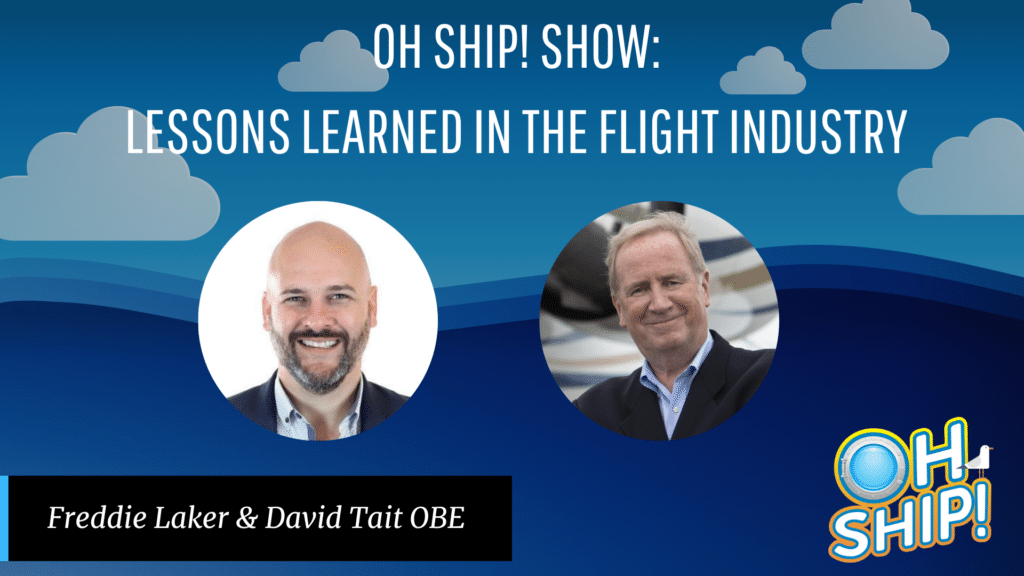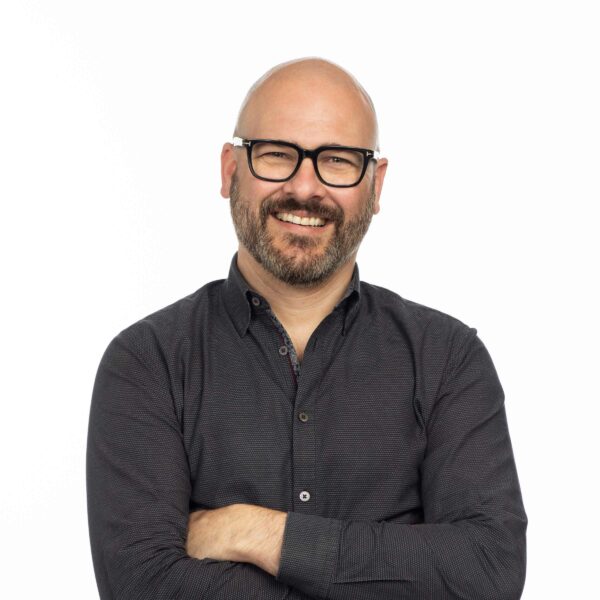David shares major hurdles and growing pains from the early days of the industry.
David Tait, managing partner with CONSULTAIT, has a legacy that’s hard to beat: He was one of the key players in revolutionizing the flight industry by making air travel accessible to the masses. He worked alongside Freddie’s father, Freddie Laker, to accomplish that ambitious goal. Having been involved with Laker Airways and then Virgin Atlantic, he’s seen a lot in his day—including a few major Oh Ship! moments.
Revolutionizing the flight industry
David and Freddie Laker launched Laker Airways back in 1966 when a person had to be part of a club to fly, as chartered flights were required. Oddly named clubs were always springing up; David recalls a “bunch of nuns who weren’t quite nuns” narrowly escaping arrest. British Airways was owned by the government, which also controlled the prices. The cost of flying with Laker Airways to New York—a one-hour flight—was the same as flying with British Airways to Paris, which took a full nine hours.
Later, Freddie’s father would be knighted by the queen for “allowing the common man to travel.” David jokes that they threw him a bone “like a poor man’s night” by bestowing upon him the title of “Officer of the Order of the British Empire” (that’s where the “OBE” comes from).
They had a serious Oh Ship! moment when the other airlines colluded against them in a major trust-busting case. In 1982, the McDonnell Douglas airplane company withdrew $15 million of financing due to pressure from major airlines, which threatened never to buy another airplane from them again if they financed Laker. They’d become the fourth-largest carrier in the North Atlantic and added a business class; the other airlines knew they couldn’t compete while playing by the rules.
At least, they thought, they had the law on their side. Laker Airways launched an anti-trust suit, but astoundingly, Regan asked the Justice Department to shut it down (presumably to secure Thatcher’s support for the Star Wars program).
Virgin picked up the torch and ran with it after that. David was amused to see Richard Branson, “a bearded rock-and-rollie guy from the music industry,” looking to get into aviation. He told his wife, “It probably won’t last a year” but said he was going to do it. “It almost didn’t at one stage—Richard had to sell Virgin Records to fund the airline,” he says.
But Branson had spotted a golden opportunity. He saw that service and prices were terrible, and a huge untapped market existed. “He thought you’d have to try pretty hard to do it any worse than the companies were doing at the time,” David explains.
Lessons learned with Virgin Airlines
Alongside Branson, David helped forge a path for succeeding as a budget-friendly airline. Here are some of the key lessons they learned along the way.
#1: Discover what your competition can’t do – and do it.
Branson always “looked at businesses from the outside in, from the consumer standpoint,” says David. They knew that price was a key differentiator now, but that wouldn’t always be the case.
Don’t hang your hat on price alone, he urges. “At Virgin, we learned to do things that had elements that couldn’t be copied,” he explains. “Price can be matched.”
“We leveraged our smallness by doing things that we knew the competition couldn’t do,” he continues. Since they had just one 747 for their first three years, they included limos for business-class passengers, which they knew big airlines couldn’t do. At one point, they even had a team of masseurs and manicurists for the upper-class passengers.
#2: Be audacious.
Around 1990, they used their ingenuity to create a Superbowl ad that cost next to nothing. They borrowed an airship and wrote “Fly Virgin” on the side, then put a belly banner underneath it that said “NBC Cameramen Are the Best Looking,” as NBC was broadcasting the event. Every time they cut away to someone else’s half-million-dollar ad, the cameras would go to them first!
Another time, British Airways ran a two-page spread in The New York Times saying, “More people fly British Airways internationally than on any other airline…duh.” The next day, they blew their advertising budget to have the paper run an ad on the right-hand side saying, “More people switch to Virgin Atlantic from British Airways than from any other airline…hah!”
People thought, “If these guys are as much fun as they appear to be, then they must be fun to fly with as well,” David says.
#3: Be the face of the company
At a time when other airline executives wore suits and sat behind desks, Freddie had made a point to get out and meet passengers on a regular basis, even flying with them. David and Branson learned to do the same thing.
Richard did a lot of silly and risky things for publicity as well, which they leveraged to build their image. His boat sank in a competition for fastest ocean crossing from New York to London, and an image on the front page of The New York Times showed the Virgin logo on the bow of a sinking speed boat. Another time, he overshot California and landed at a frozen lake in the northwest territories, just ahead of a snowstorm, David recalls.
Listen to those you trust.
Not every risk is worth taking—or right for your brand, they learned. Case in point: Richard once wanted to launch a product called “Virgin Condoms,” only to have his wife ask, “Are you nuts?” He also thought of starting a bridal company (“Virgin Bride”), which David politely calls “a bit of a stretch in terms of branding,” partly because Richard even had a picture taken of himself in a full white bridal gown with his hairy chest showing. The takeaway: If you’re going to be audacious, it’s still best to run an idea by someone you trust first.
He describes himself as an optimist, a consensus-builder, and a good listener. “It’s important to get everyone’s input, and if you get people involved in it, then it builds pride of association,” he says. “You never learn anything by listening to yourself speak,” he says.
David feels deeply satisfied with his legacy of transforming the industry forever. “I’m very lucky to have been involved with two of the biggest, most incredible against-the-odds brand-building exercises in the history of aviation,” he says. “Both of us did it on a wing and a prayer, and both of us really had no right to succeed in the face of the kind of competition we had.”





